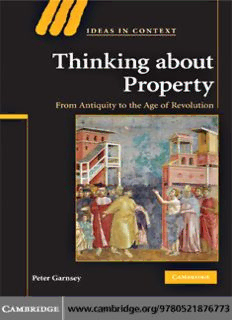
Thinking about Property: From Antiquity to the Age of Revolution (Ideas in Context) PDF
Preview Thinking about Property: From Antiquity to the Age of Revolution (Ideas in Context)
This page intentionally left blank THINKING ABOUT PROPERTY InthisbookProfessorGarnseyexploresancient‘foundational’texts relating to property and their reception by later thinkers in their various contexts up to the early nineteenth century. The texts include Plato’s vision of an ideal polity in the Republic, Jesus’ teachings on renunciation and poverty, and Golden Age narratives and other evolutionary accounts of the transition of mankind from primeval communality to regimes of ownership. The issue of the legitimacy of private ownership exercises the minds of the major political thinkers as well as theologians and jurists throughout the ages. Among those whose ideas are woven into the discussion are Plato,Aristotle,Cicero,Jesus,Augustine,ThomasAquinas,Bartolus, William of Ockham, Plethon of Mistra, Grotius, Pufendorf, Locke, Hume, Rousseau, Kant, Hegel and Proudhon. The book gives full consideration to the historical development of Rights Theory, with special reference to the right to property.It challenges the dominant historical paradigm that the ancient world made little or no contri- butiontoRightsTheory.Thebookendswithacomparativestudyof the Declarations of Rights in the American and French Revolutions and seeks to explain, with reference to contemporary documents, why the French recognized an inalienable, human right to property whereas the Americans did not. peter garnsey is Director of Research in the Faculty of History attheUniversityofCambridge,havingpreviouslybeenProfessorofthe HistoryofClassicalAntiquity.HisrecentbooksincludeIdeasofSlavery fromAristotletoAugustine(1996),FoodandSocietyinClassicalAntiquity (1999), (with Caroline Humfress) The Evolution of the Late Antique World (2001) and (with Anthony Bowen) a translation, with intro- ductionandnotes,ofLactantius’DivineInstitutes(2003). ideas in context Edited by Quentin Skinner and James Tully Thebooksin this series will discuss theemergence of intellectual traditionsand of related new disciplines. The procedures, aims and vocabularies that were generated will be set in the context of the alternatives available within the con- temporary frameworks of ideas and institutions. Through detailed studies of the evolution of such traditions, and their modification by different audiences, it is hoped thata newpicture willformof thedevelopment of ideas intheirconcrete contexts. By this means, artificial distinctions between the history of philosophy, of the various sciences, of society and politics, and of literature may be seen to dissolve. The series is published with the support of the Exxon Foundation. A list of books in the series will be found at the end of the volume. THINKING ABOUT PROPERTY From Antiquity to the Age of Revolution PETER GARNSEY UniversityofCambridge CAMBRIDGEUNIVERSITYPRESS Cambridge, New York, Melbourne, Madrid, Cape Town, Singapore, São Paulo Cambridge University Press The Edinburgh Building, Cambridge CB28RU, UK Published in the United States of America by Cambridge University Press, New York www.cambridge.org Information on this title: www.cambridge.org/9780521876773 © Peter Garnsey 2007 This publication is in copyright. Subject to statutory exception and to the provision of relevant collective licensing agreements, no reproduction of any part may take place without the written permission of Cambridge University Press. First published in print format 2007 ISBN-13 978-0-511-37901-7 eBook (NetLibrary) ISBN-13 978-0-521-87677-3 hardback ISBN-13 978-0-521-70023-8 paperback Cambridge University Press has no responsibility for the persistence or accuracy of urls for external or third-party internet websites referred to in this publication, and does not guarantee that any content on such websites is, or will remain, accurate or appropriate. To R.G. R.G. C.H. Contents Abbreviations page viii Preface ix Introduction 1 1 Plato’s ‘communism’, Aristotle’s critique and Proclus’ response 6 2 Plato’s ‘communism’: from late antiquity via Islamic Spain to the Renaissance 31 3 Renunciation and communality: thinking through the primitive Church 59 4 The poverty of Christ: crises of asceticism from the Pelagians to the Franciscans 84 5 The state of nature and the origin of private property: Hesiod to William of Ockham 107 6 The state of nature and the origin of private property: Grotius to Hegel 136 7 Property as a legal right 177 8 Property as a human right 204 Conclusion 233 Bibliography 238 Index 262 Abbreviations AARC Atti dell’ Accademia Romanistica Costantiniana AFLN Annali della Facolta` di Lettere e Filosofia di Napoli AJPh American Journal of Philology ANRW Aufstieg und Niedergang der ro¨mischen Welt CJ Codex Iustinianus CQ Classical Quarterly CSEL Corpus Scriptorum Ecclesiasticorum Latinorum CTh. Codex Theodosianus GCS Die griechischen christlichen Schriftsteller der ersten drei Jahrhunderte IJ Institutes of Justinian JbAC Jahrbuch fu¨r Antike und Christentum JRS Journal of Roman Studies JTS Journal of Theological Studies OSAP Oxford Studies in Ancient Philosophy PG J.P. Migne, Patrologiae cursus completus: Series Graeca, Paris 1857–66 PL J.P. Migne, Patrologia Latina, Paris 1841–55 REG Revue des ´etudes grecques RHD Revue Historique de Droit Fran¸cais et Etranger RIDA Revue Internationale des Droits de l’Antiquit´e RISG Rivista Italiana per le Scienze Giuridiche SC Sources Chr´etiennes SDHI Studia et Documenta Historiae et Iuris SP Studia Patristica St. Mon. Studia Monastica TAPA Transactions of the American Philological Association ZSS Zeitschrift der Savigny-Stiftung fu¨r Rechtsgeschichte
Description: